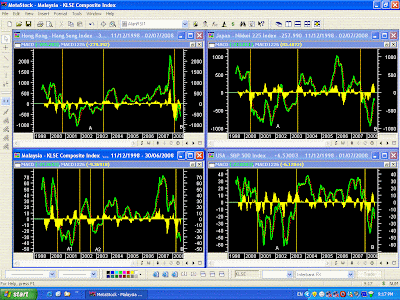 The current weak economic and stock market conditions need no further explanation. Many people have been asking whether we are at the lowest ebb and have we reached the capitulatory stage that spells the very final bottom? Well, I would like to share with you an interesting finding which may be able to answer the above questions. This finding is based solely on a technical analysis indicator, namely the Weekly MACD.
The current weak economic and stock market conditions need no further explanation. Many people have been asking whether we are at the lowest ebb and have we reached the capitulatory stage that spells the very final bottom? Well, I would like to share with you an interesting finding which may be able to answer the above questions. This finding is based solely on a technical analysis indicator, namely the Weekly MACD.From the four stock market charts- S&P, Nikkei, KLSE and HangSeng above, we will notice that in a 10 years time frame of analysis beginning 1998, there were only twice the Weekly MACD went below the negative level. By negative level, it means the market is on a major downtrend mode even though it may have its ups and downs intervals. The down trend periods are indicated as period A(roughly from middle of 2001 - middle of 2003) and period B( beginning of 2008 till ..?) Hey, isn't the US experiencing recession then in 2001-2003? If history repeats itself all over again and again, the charts imply world markets will only recover and a major uptrend can be seen late 2009 or 2010. Soon after that, market will have a major uptrend for the next 4 years. True?
(It should be noted however, all technical indicators have their fair share of pros and cons and cannot be used in isolation but must be accompanied with a few other indicators. Further, I agree longer periods of analysis may be required to result a more consistent conclusion).
* WSJ: A German bank note printing company has agreed to stop deliveries to Zimbabwe after being pressured by the German Government. With inflation rate of well over 1 million %, Mugabe will have to stay in power without the fresh supply of paper.
* Reuters: Nikkei's longest losing streak of 9 days created 43 years ago was broken today.
* FT.com: Fears are mounting in Venezuela that regulations designed to prevent currency speculation and capitalise the banking system could trigger the collapse of several banks and hit sovereign debt prices.
* South Korea's foreign exchange reserves fell to USD258.1b in June as the Central bank sold USD5b to curb Won's steep fall. The won has dropped almost 11% this year and put pressure on inflation by making imports more expensive. Growth is expected to be 4.7%(2007: 5%) while inflation is expected to be at 4.8%.
*Forbes: A study by World Economic Forum notes that the most wired nations in the world are as follow:- Sweden, Iceland, Switzerland, Netherlands, Denmark, Hong Kong, South Korea, USA.

No comments:
Post a Comment